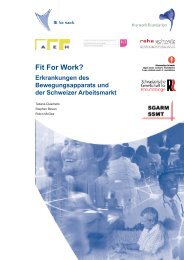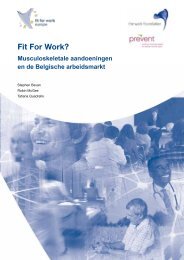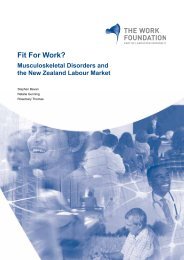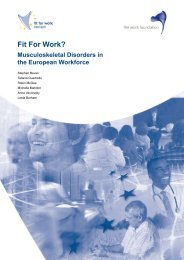FfW Bulgarian report (English language) - Fit for Work Europe
FfW Bulgarian report (English language) - Fit for Work Europe
FfW Bulgarian report (English language) - Fit for Work Europe
You also want an ePaper? Increase the reach of your titles
YUMPU automatically turns print PDFs into web optimized ePapers that Google loves.
RA in Bulgaria who receive biologic treatments is lower than in most <strong>Europe</strong>an countries<br />
with proportions ranging from less than 1 per cent of patients (Kolbelt and Kastaeng, 2009)<br />
to 1.8 per cent (Orlewska, Ancuta, Anic, Codrenau, Damjanov et al., 2011).This is very low<br />
indeed compared with the <strong>Europe</strong>an treatment average of 9-10 per cent, however it may<br />
reflect the state of Bulgaria’s GDP. According to Kobelt and Kastaeng the use of biologics <strong>for</strong><br />
RA corresponds to the wealth of the country where countries with a lower GDP are less likely<br />
to af<strong>for</strong>d the high costs associated with this type of treatment. Indeed, the af<strong>for</strong>dability index<br />
<strong>for</strong> biologic treatment in Bulgaria is the lowest among all the countries studied (Kolbelt and<br />
Kastaeng, 2009).<br />
In addition, the <strong>Bulgarian</strong> ‘Drug Act’ (2007) does not appear to take into consideration the quality<br />
of life and work outcomes when evaluating the benefits of drugs recommended <strong>for</strong> treatment. It<br />
is important that the cost-effectiveness analysis of treatment recognises the need to ‘spend to<br />
save’, as often the savings associated delayed benefits of certain treatment, such as facilitated<br />
return to work and longer working life outweigh the immediate cost of the intervention.<br />
Due to insufficient number of consultants in Bulgaria and poor diagnosis treatment is delayed<br />
<strong>for</strong> some RA patients who would benefit from anti-TNF drug therapies in order to prevent<br />
incapacity. 38 Where structural damage of joints has already occurred, the patients may require<br />
surgery to replace joints; however, the high costs associated with the procedure may hinder<br />
access to treatment. For many who have lost their jobs due to incapacity and have no funds<br />
to support themselves, an intervention that would support to return them to work is largely<br />
unaf<strong>for</strong>dable. 39<br />
Medical interventions in the <strong>for</strong>m of drug therapy to control inflammation and disease<br />
progression, and surgery to redress structural damage are only part of managing the care of<br />
RA patients. Other important elements include patient education and empowerment, practical<br />
self-management to help deal with symptoms and specialist support to help live with the disease<br />
and its consequences. The effective management of RA has to involve not only the clinical<br />
team (including GPs, consultant rheumatologists, physiotherapists, occupational therapists,<br />
chiropodists, podiatrists, pharmacists, primary care nurses and orthopaedic surgeons), but the<br />
participation of the patient and, ideally, their employers and relevant patient groups. Patient<br />
organisations exist in Bulgaria but they rely almost entirely on volunteers (often with the<br />
rheumatic conditions themselves) and some financial support from pharmaceutical companies,<br />
however, due to limited resources they are restricted by what impact they could have. 40 One<br />
38 Expert interview<br />
39 Expert interview<br />
40 Expert interview<br />
Interventions<br />
<strong>Fit</strong> For <strong>Work</strong>? 51







